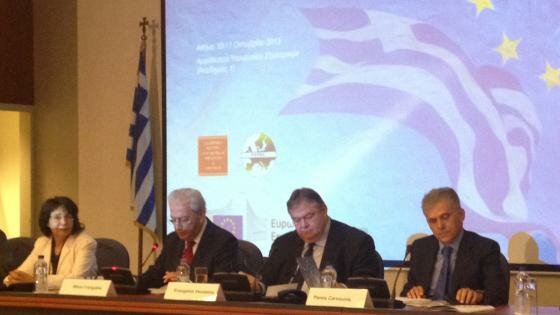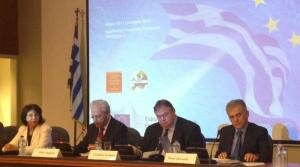The pre-presidency Trans European Policy Studies Association (TEPSA) conference, organized in view of the upcoming Greek Presidency of the Council of the European Union by TEPSA and the Greek Centre of European Studies and Research (EKEME), with the support of the European Commission Representation in Greece, was held in Athens between 10 and 11 October 2013 under the title “To overcome the crisis, the EU must move ahead”.
The deputy Prime Minister and Foreign Minister Evangelos Venizelos welcomed the top-ranking officials, politicians, EU institution representatives and high profile academics gathered in the premises of the Ministry of Foreign Affairs. The policy makers and experts had the opportunity to discuss the Greek presidency priorities as well as issues such as the new economic and institutional realities, EU in the world, the EU and the quest for energy security, the EU and its citizens: the impact of the crisis.
In his welcome address, the deputy Prime Minister Evangelos Venizelos maintained that "in view of the pan-european parliamentary election campaign, a new narrative for Europe is necessary". He added that "this narrative has to turn back to the basics, restoring the historic features of Europe [...] as well as the initial ambitions of the European integration project". The deputy Prime Minister emphasized among other things the need "to talk again about the meaning of politics, European integration, democracy, institutional equality, fundamental rights and tolerance".
The deputy Prime Minister stated that "presidency priorities are usually dictated by the needs and necessities of the EU itself, even though it would not have been possible for the Greek presidency to have priorities other than growth and jobs, integration of economic governance, migration and maritime policy".
Recommendations from the members of the TEPSA network concerning the priorities and challenges of the Greek presidency as well as opinions and proposals expressed from all participants at both political and academic levels, were of utmost significance for the Presidency and the entire EU.









